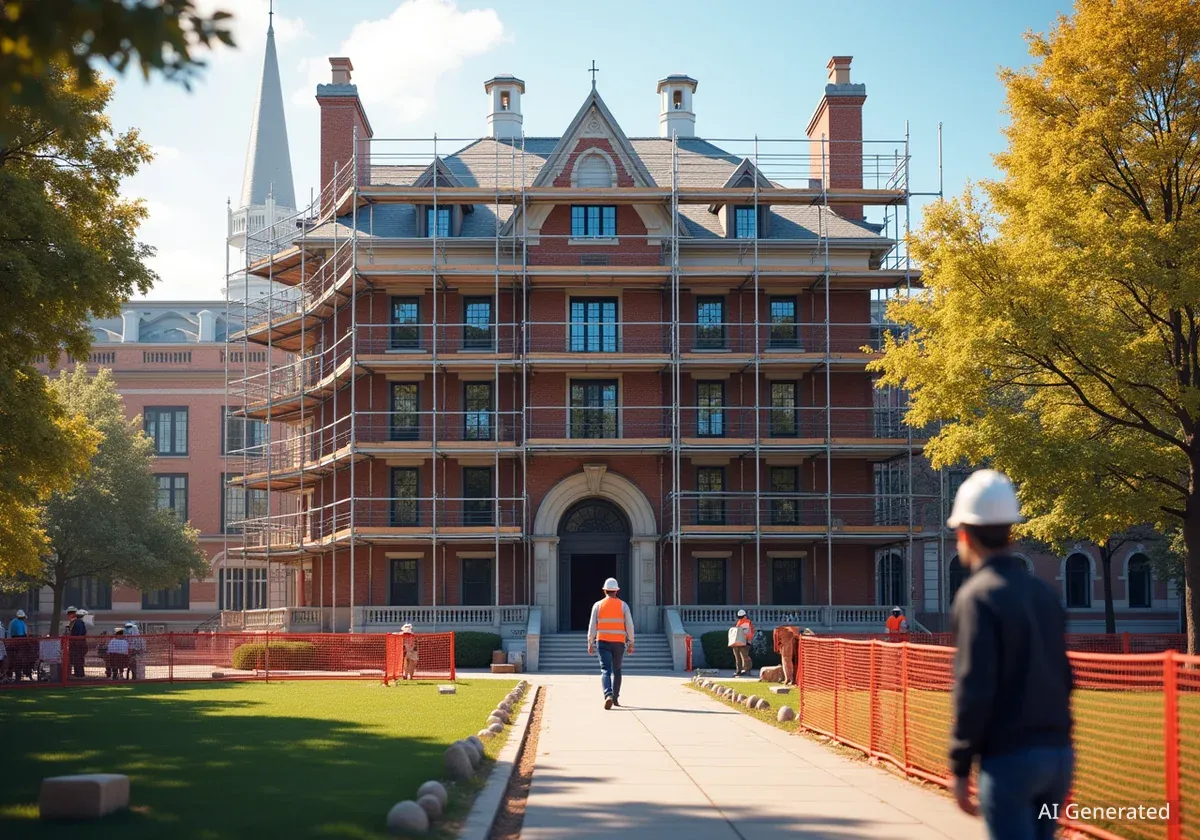The University of Pennsylvania's extensive renovation project for the Quadrangle's three College Houses is nearing its conclusion. Started in May 2023, the multi-phase project is set to finish in August 2026, with significant upgrades to infrastructure, accessibility, and student living spaces.
Key Takeaways
- Quad renovations began in May 2023 and will conclude in August 2026.
- The project focuses on updating mechanical, electrical, roof, and window systems.
- New amenities include improved bathrooms, common areas, furniture, and elevators.
- Riepe and Ware College Houses are already complete, with Fisher Hassenfeld finishing in 2026.
- Student feedback on the completed phases has been largely positive.
Comprehensive Upgrades to College House Infrastructure
The University of Pennsylvania initiated a major renovation of its historic Quadrangle in May 2023. This project addresses the critical need for updated infrastructure across Riepe, Ware, and Fisher Hassenfeld College Houses. The overall goal is to enhance the living experience for first-year students.
According to Scott Nobel, Director for Design and Construction, the renovations primarily focus on improving fundamental building systems. This includes upgrading mechanical and electrical systems, which are vital for modern campus living. Additionally, new roofs and windows are being installed to improve energy efficiency and building longevity.
Renovation Timeline
- May 2023: Renovation project begins.
- August 2024: Riepe College House renovations completed.
- August 2025: Ware College House renovations completed.
- August 2026: Fisher Hassenfeld College House renovations expected to be completed, marking the project's end.
Enhancing Student Experience and Accessibility
A significant aspect of the renovation involves improving student amenities. New and improved bathrooms are a key feature, addressing a common concern in older dormitories. Common spaces have also been redesigned to be more functional and appealing, meeting what Director of Residential Services Pat Killilee described as "today’s needs."
New furniture is being provided in residential rooms and common areas, contributing to a more comfortable and modern living environment. One of the most impactful additions for accessibility is the installation of elevators. Two new elevators have been added, one in Riepe and one in Ware, making these buildings significantly more accessible than before.
"Because of the age of the building, it can never be 100% accessible, but it is significantly more accessible now than it was three years ago," Killilee stated.
The last major renovations to the Quad occurred approximately 25 years ago. This places the current project within a regular cycle of necessary improvements to maintain high standards for student housing.
Student Feedback on Renovated Spaces
First-year students living in the renovated college houses have expressed general approval of the changes. Ava Martoma, a Wharton and Engineering first-year student residing in Ware, highlighted the improved bathrooms and common spaces.
"The common spaces are nice," Martoma noted. "I think the bathrooms are very nice compared to most dorm bathrooms that I’ve been in."
Sean Liao, a Wharton first-year living in Riepe, also praised the renovations. He particularly appreciated the new study lounges, viewing them as valuable additions to the Quad's already convenient location and active social scene.
The Quadrangle's Role at Penn
The Quadrangle, often simply called the Quad, is a historic residential complex at the University of Pennsylvania. It traditionally houses a significant portion of the university's first-year student population. Its architecture and central location make it a prominent feature of campus life, fostering community among new students.
Minimizing Disruption During Construction
Previous renovation phases, particularly to Ware College House, caused some disruption to student life, including social and residential impacts. However, current first-year students have reported fewer issues during the Fisher Hassenfeld renovations.
Scott Nobel explained that the university implemented several strategies to minimize negative impacts. These measures include dividing the project into three distinct phases, isolating construction zones, and carefully scheduling work to align with the academic calendar. Contractors adjusted work hours to avoid early morning starts, and reading days were considered in the planning.
Addressing Specific Student Concerns
Despite overall positive feedback, some minor issues have emerged. Ware residents, for example, pointed out the absence of a water filling station in their building as a primary concern. Killilee acknowledged this oversight, stating that efforts are underway to install a water filling station in Ware during the current academic year. Riepe College House already has one, and Fisher Hassenfeld will include one upon completion.
Another Ware resident, Anthony Yu, a Wharton and Engineering first-year, raised concerns about air quality in the renovated building. He mentioned keeping his window open frequently. However, the project emphasizes sustainability, ensuring that new equipment is commissioned to optimal levels. This focus aims to improve the student experience by creating refreshed, functional, and accessible spaces while also reducing maintenance needs.
The project is a significant investment in student well-being and campus infrastructure, designed to serve future generations of Penn students. The final phase completion in August 2026 will mark a new chapter for the Quadrangle, blending its historic charm with modern functionality.





